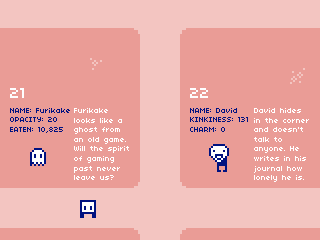Tanaka's Friendly Adventure
Thursday, July 30, 2009 by Sergio
Click here to play the new version of Tanaka's Friendly Adventure online
Click here to download the original version of Tanaka's Friendly Adventure (Windows only)

All interaction in this game is handled with the arrow keys. Using these, the player moves the central character Tanaka, choosing from one of four directions to pursue in a seemingly endless grid of identical intersections. At each intersection a new friend appears to join Tanaka. This repeats until enough friends have been collected for Tanaka's party.
To me it seems that the theme of social interaction is distanced from the actions actually performed in the game, but I suppose it could be argued that one can make friends just by walking around. Walking as the only gameplay makes for a boring game, but this is redeemed through “party mode” in which the cute characters encountered throughout the game are displayed along with amusing descriptions.

The game uses a retro aesthetic, featuring basic chiptune-style music, only a few colours and a very limited supply of pixels. This style exists not out of any necessity but rather to draw reference to a simpler time in the history of video games.
If you'd rather not play the game at all, you can watch a rather low-quality video of the game in action. Or, if you're the sort of person who would be obsessed with collecting every friend, a fan-made map of the game has been created to assist you.
I would like to hear about whether this appeals to people or not. Comments, though I don't expect to see many, will probably influence my future blog posts.